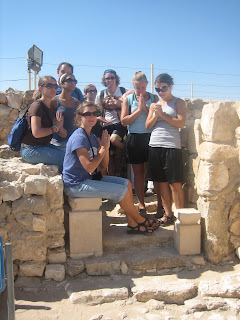
An eye for an eye, a tooth for a tooth. I used to cringe when I heard these bloody words. Doesn’t exactly sound like grace, does it?
As we stood around a sacrificial altar at Tel Beer-sheva, those were my initial thoughts as Dr. Wright talked about the law of Moses. However, in light of Middle-Eastern culture, I’m starting to recognize the incredible grace of the Torah.
In the Middle East, there is a ruthless cycle of revenge—counter revenge that exists to this day. It increases exponentially. Before Moses’ words, if I poked someone’s eye out, they would respond with poking both of mine out. This sort of escalating retaliation still exists today. For instance, one of our bus drivers recently ran over 36 sheep in the wilderness, killing them all. He was ready and willing to replace each one of those 36 sheep, but the Bedouin owner was not satisfied with that. He wanted to kill our bus driver as revenge for his sheep. Now the case is going to court.
So while “an eye for an eye, a tooth for a tooth,” sounds primitive and harsh to our American ears, to a Middle-Easterner’s ears it sounds full of grace and mercy…a radical concept! Even in the Torah, our God is a God of grace.
Another example of grace in the Torah are the “cities of refuge” that were set up. According to the Law of Moses, if someone accidentally killed someone, they could flee to one of these cities and put their arms around the horn of the altar. This symbolized that they were willingly exiling themselves as punishment for what they had done, but would not be killed in revenge. The people of the city were to “adopt” this person as one of their own. Again, such grace and mercy is radical in the Middle East.
Instead of reading the Torah as bloody and restrictive and boring, I’m learning to read it as an expression of God’s eternal grace and mercy.
Today was the second day of our field study, and we explored the Negev. One of my favorite things we did today was hiking the Nahal Zin--part of the wilderness where the Israelites wandered for 40 years. The hike was quite intense, and for many parts the incline was so steep we had to use ladders to scale the rock.
Beginning our hike:

We made it to the top!

Another favorite was watching the sunset over the Makhtesh Ramon as we meditated on Psalm 90, perhaps written by Moses as he wandered this same area. God is so BIG and I am so small! He is eternal like this huge rock crater; my life is short like the grass that’s green in the morning but fries to nothing in the blazing afternoon sun. With this perspective, we can pray “God, establish the work of our hands!” What a privilege that what we do in this short life can last for eternity—bringing people into His kingdom.


No comments:
Post a Comment